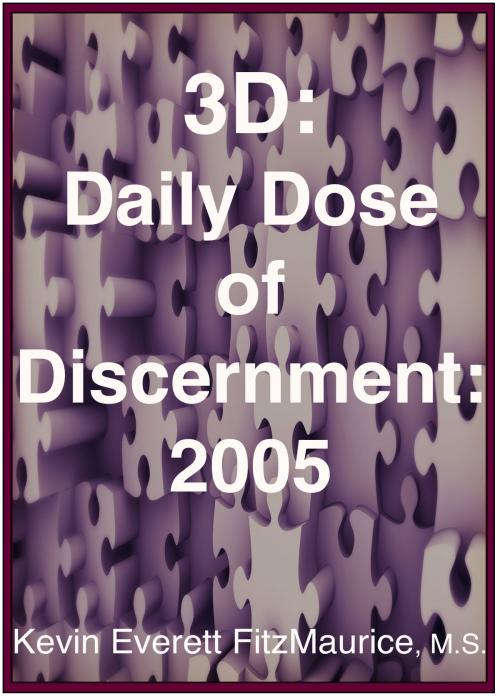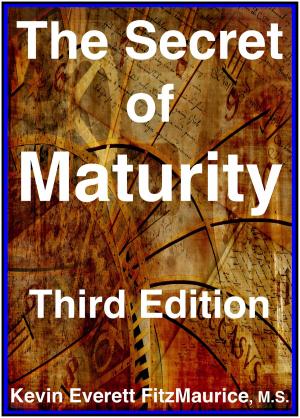3D: Daily Dose of Discernment: 2005
Nonfiction, Religion & Spirituality, Philosophy, Eastern, Mind & Body, Inspiration & Meditation, Spirituality| Author: | Kevin Everett FitzMaurice | ISBN: | 9781878693235 |
| Publisher: | FitzMaurice Publishers | Publication: | October 12, 2011 |
| Imprint: | Language: | English |
| Author: | Kevin Everett FitzMaurice |
| ISBN: | 9781878693235 |
| Publisher: | FitzMaurice Publishers |
| Publication: | October 12, 2011 |
| Imprint: | |
| Language: | English |
This book is a collection of sayings for each day of the year 2005. Each saying is dated in the mathematical fashion, that is, with the numbers in descending-size order. The sayings cover various topics. Topics include psychotherapy, psychology, philosophy, psychological skills, General Semantics, Eastern psychology, Eastern philosophy, meditation, flow, identity, authenticity, responsibility, the nature of self, and social commentary among others. The sayings were originally posted on the authors website. They were edited for this book, and the edited versions now replace the original website versions. Editing was done for typos, grammar, and spelling. Editing was also done for duplicates, clarity of meaning, and precision. However, attempts were made to maintain the original meanings and intentions. For the sake of a general audience No was placed after some of the sayings that are ironic. They are ironic because they state principles people follow that they should not be following. Please excuse the few we missed to notate this way.You will discover sayings useful to understanding Eastern thought and General Semantics. The agreement between General Semantics and Eastern philosophy is profound, illuminating, and deepens the understanding of both. For instance, the expressions, The description is not the described, and, The thought is not the thing, are found in both Eastern philosophy and General Semantics. Both systems arrive at reality as nonverbal, silent, and beyond comprehension with thought. This despite the fact that one is spiritual and one is atheistic. That two entirely different approaches arrive at the same ultimate conclusions is exciting and enlightening.It is important to understand the usage of the word change in this book. Change is considered an impossibility for psychological entities such as thoughts, feelings, and sensations. However, sometimes the book recommends change or describes how to change. This is consistent because change can have the meaning of transforming into something else, which is wrong for psychological usage. And change can have the meaning of switching to something else, which is right for psychological usage. You do not change your dog into a cat. You can change from having a dog to having a cat. You change your shirt by switching to a different shirt, not by mutating your current shirt into another shirt. Switch, not change. Or change in the sense of turning, shifting, transferring, or redirecting, not evolving. More discussion on change can be found in Attitude Is All You Need! Second Edition.The authors works offer 6 different approaches to self-help. (1) In Breathe, you discover methods for congruence, self-relaxation, self-calming, and self-centering. (2) In Garden, you discover methods for sorting out what thoughts work for you and what thoughts work against you. You also learn how to increase your productive thoughts and to decrease your unproductive thoughts. (3) In Not, you discover methods to stop using the number one mistake that underlies failure. You also learn how to be a more effective parent or leader. (4) In Ego, you discover methods to reduce your devotion to and dependence on ego. You also learn how to be free, happy, and more creative. (5) In Attitude Is All You Need!, you discover methods to sort out what attitudes are working for you and what attitudes are working against you. You also learn how to increase your productive attitudes and how to decrease your unproductive attitudes. (6) In the four books Something For Nothing, Anything Goes, Acid Test, and 3D: Daily Dose of Discernment: 2005 you are given sayings and aphorism to use for introspection, contemplation, and meditation. Please experiment until you find the one or two approaches that work best for you. Worry not if the approaches are the best for anyone else.
This book is a collection of sayings for each day of the year 2005. Each saying is dated in the mathematical fashion, that is, with the numbers in descending-size order. The sayings cover various topics. Topics include psychotherapy, psychology, philosophy, psychological skills, General Semantics, Eastern psychology, Eastern philosophy, meditation, flow, identity, authenticity, responsibility, the nature of self, and social commentary among others. The sayings were originally posted on the authors website. They were edited for this book, and the edited versions now replace the original website versions. Editing was done for typos, grammar, and spelling. Editing was also done for duplicates, clarity of meaning, and precision. However, attempts were made to maintain the original meanings and intentions. For the sake of a general audience No was placed after some of the sayings that are ironic. They are ironic because they state principles people follow that they should not be following. Please excuse the few we missed to notate this way.You will discover sayings useful to understanding Eastern thought and General Semantics. The agreement between General Semantics and Eastern philosophy is profound, illuminating, and deepens the understanding of both. For instance, the expressions, The description is not the described, and, The thought is not the thing, are found in both Eastern philosophy and General Semantics. Both systems arrive at reality as nonverbal, silent, and beyond comprehension with thought. This despite the fact that one is spiritual and one is atheistic. That two entirely different approaches arrive at the same ultimate conclusions is exciting and enlightening.It is important to understand the usage of the word change in this book. Change is considered an impossibility for psychological entities such as thoughts, feelings, and sensations. However, sometimes the book recommends change or describes how to change. This is consistent because change can have the meaning of transforming into something else, which is wrong for psychological usage. And change can have the meaning of switching to something else, which is right for psychological usage. You do not change your dog into a cat. You can change from having a dog to having a cat. You change your shirt by switching to a different shirt, not by mutating your current shirt into another shirt. Switch, not change. Or change in the sense of turning, shifting, transferring, or redirecting, not evolving. More discussion on change can be found in Attitude Is All You Need! Second Edition.The authors works offer 6 different approaches to self-help. (1) In Breathe, you discover methods for congruence, self-relaxation, self-calming, and self-centering. (2) In Garden, you discover methods for sorting out what thoughts work for you and what thoughts work against you. You also learn how to increase your productive thoughts and to decrease your unproductive thoughts. (3) In Not, you discover methods to stop using the number one mistake that underlies failure. You also learn how to be a more effective parent or leader. (4) In Ego, you discover methods to reduce your devotion to and dependence on ego. You also learn how to be free, happy, and more creative. (5) In Attitude Is All You Need!, you discover methods to sort out what attitudes are working for you and what attitudes are working against you. You also learn how to increase your productive attitudes and how to decrease your unproductive attitudes. (6) In the four books Something For Nothing, Anything Goes, Acid Test, and 3D: Daily Dose of Discernment: 2005 you are given sayings and aphorism to use for introspection, contemplation, and meditation. Please experiment until you find the one or two approaches that work best for you. Worry not if the approaches are the best for anyone else.















